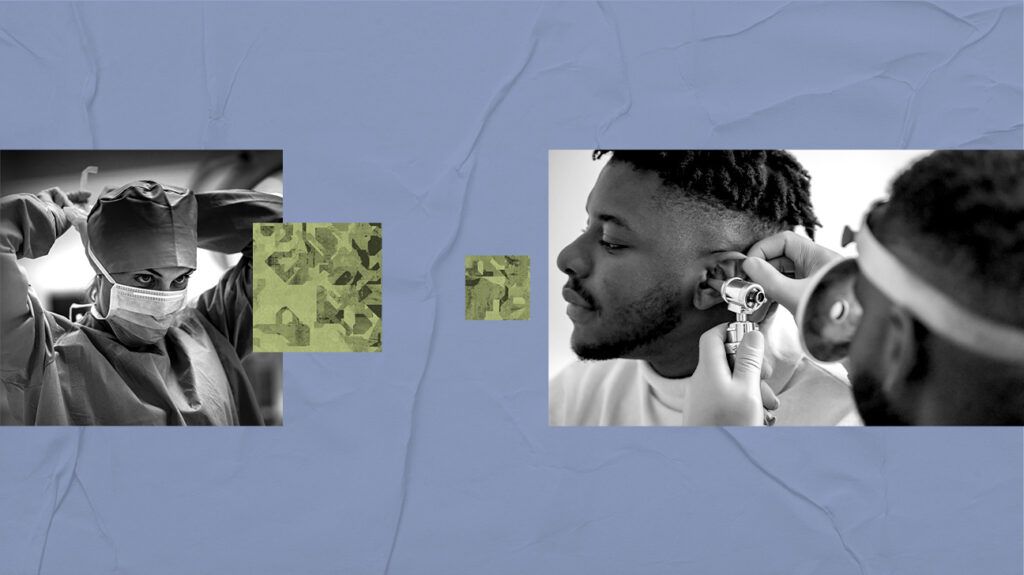Doctors rarely recommend surgery for tinnitus. However, undergoing surgery for another condition, such as hearing loss due to otosclerosis, may help improve tinnitus.
Tinnitus can cause a frustrating buzzing or ringing sound in the ears. It may be a symptom of an underlying condition, such as an ear injury, hearing loss, or other issues involving the cardiocirculatory system, but the cause is usually unknown.
Sometimes, surgery to address hearing loss can improve tinnitus, but doctors do not recommend surgery specifically for tinnitus.
This article discusses how hearing loss surgery may improve tinnitus, what it involves, and other treatment options available to manage tinnitus.

No. Doctors do not recommend surgery specifically for tinnitus.
Doctors
A stapedectomy is a procedure to remove all or part of the stapes, a hearing bone, and replace it with an artificial bone, or prosthesis. This can improve hearing loss and tinnitus.
A similar procedure is a stapedotomy, in which a surgeon drills a precise hole in the stapes bone and fills the hole with a tiny prosthesis. The prosthesis can then move freely with the other bones of the middle ear to efficiently transfer sound to the inner ear and improve hearing.
Learn more about tinnitus types and symptoms.
Surgeons
The surgeon uses a knife or blade to make an incision in the ear canal or behind the ear to access the eardrum. They then lift the eardrum to reach the middle ear bones.
In a stapedectomy, the surgeon typically removes the entire stapes bone and replaces it with a prosthesis.
In a stapedotomy, the surgeon uses a laser to drill a hole in the base of the stapes bone and then inserts a prosthesis into the hole.
Once the new prosthesis is in place, the surgeon will put the eardrum back in its natural position and use packing to hold it in place while the cut heals. The bandages usually contain antibiotics to help prevent any infections.
Learn more about tinnitus and dizziness.
Stapes surgery, which includes stapedectomy and stapedotomy, is very successful in improving hearing loss and tinnitus. A 2018 review found that stapes surgery improved tinnitus in around 85% of people.
A
However, doctors only recommend stapes surgery for treating hearing loss, not for tinnitus.
After surgery, people may experience some discomfort or mild pain in the ear. They can usually go home right after the procedure, and doctors typically recommend over-the-counter pain relief medications.
People may notice some bloody discharge from their ear, but this is usually mild, so placing a cotton ball in the ear can help.
Recovering fully from stapedectomy surgery can take
Some people may require revision surgery if they experience:
- dislodgement of the graft or prosthesis
- fistulas, or an atypical connection between the inner ear and other structures of the ear
- changes to tissues in the ear, this is called reparative granuloma or granulation tissue
Learn about when tinnitus is going away.
One of the
Sound therapy can also reverse some neural changes that occur when a person experiences hearing loss, helping to relieve tinnitus. An individual can use several devices to undergo sound therapy, such as:
- a wearable sound generator
- hearing aids
- a sound generator app on a tablet or smartphone
Doctors may also recommend behavioral therapy in combination with sound therapy to help people manage the distress tinnitus can cause and learn how to ignore it. However, it may take a while before a person notices any benefits.
In the meantime, a specialist may prescribe antidepressants or other medications that help boost a person’s mood and improve their sleep quality.
Learn about tinnitus retraining therapy.
Can surgery cure tinnitus?
Doctors do not recommend surgery specifically for tinnitus. They may
What is the most effective treatment for tinnitus?
While
What is the new treatment for tinnitus?
Experts are currently testing new treatments for tinnitus based on neurostimulation,
Other treatments that are currently on trial
- deep brain stimulation
- electric stimulation
- repetitive transcranial magnetic stimulation
However, while trials of these tinnitus treatments show promising results, more research is necessary to reveal the short- and long-term benefits.
While doctors do not recommend surgery specifically to treat tinnitus, stapes surgery, which treats hearing loss, may improve it.
If a person has surgery for hearing loss, they may experience an improvement in their tinnitus symptoms.
Nonsurgical treatments for tinnitus include sound therapy and behavioral therapy, which can help manage distress and train the brain to ignore certain sounds.


